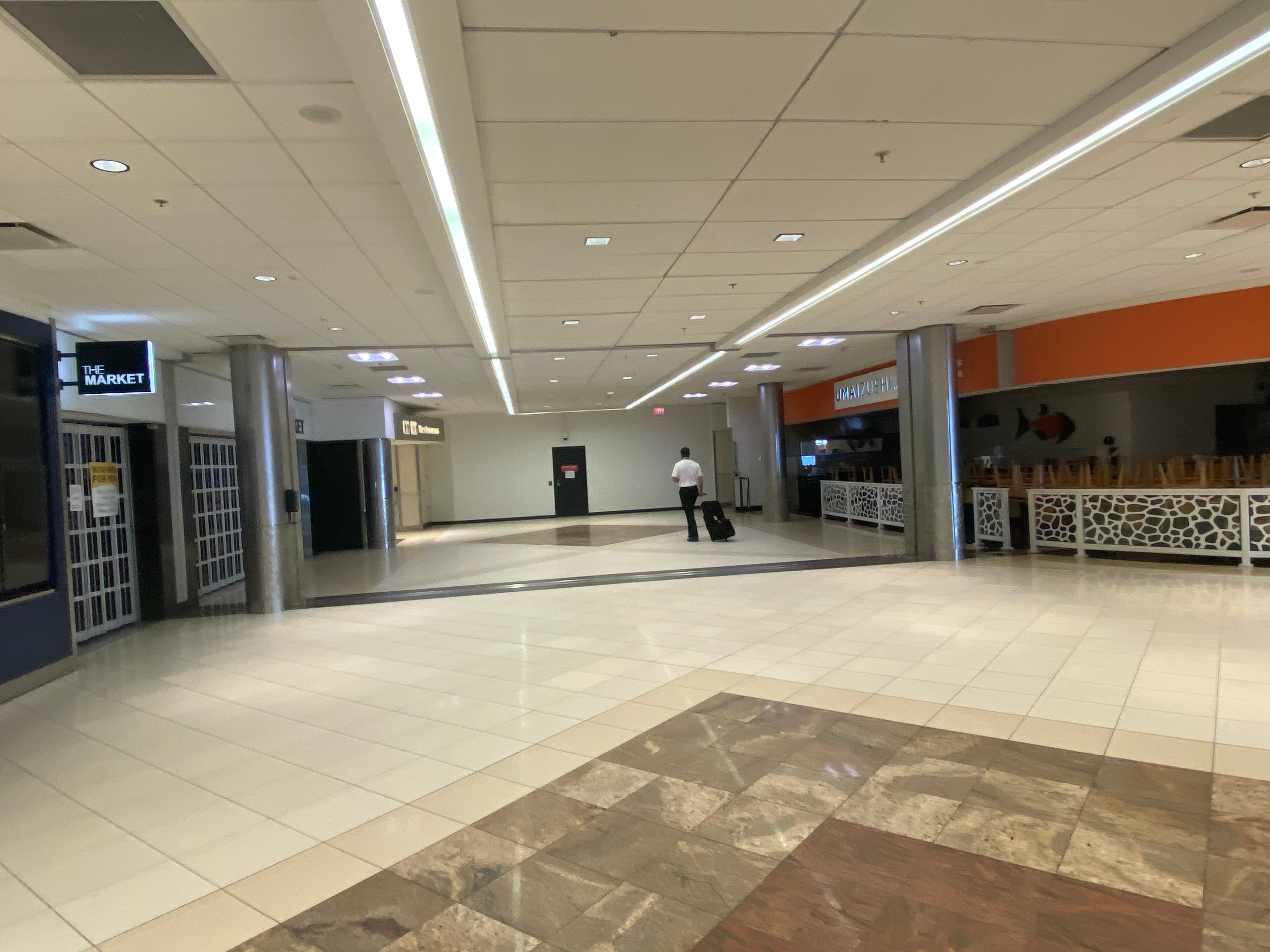Some travelers still flying through pandemic, on mostly empty planes

They pass through airport terminals that feel like ghost towns, breeze through security checkpoints and stretch out on planes that are often mostly empty.
In the smallest of numbers, there are still Americans who continue to fly, even as the coronavirus rages on.
While many in the country are holed up at home, venturing out only for essentials, these travelers are often boarding flights for work or for pressing needs in their personal lives.
And the experience these days is nothing if not bizarre.
Andrew Bashuk landed at the Atlanta airport in April after a flight from Seattle shared by just nine or 10 other passengers. When he stepped out onto Hartsfield-Jackson's Concourse D, he was floored by what he saw.
“It’s the busiest airport in the world, and I could have rolled a bowling ball from one end of the concourse to the other,” he said.
Nearly all of the concessions along the concourse were closed, he said. On the way to baggage claim, Bashuk had an entire Plane Train car to himself. When he came up the escalator, it was nothing like the hectic, crowded domestic terminal he's used to seeing.
"Normally there's dozens of people waiting to greet people," said Bashuk, who grew up in metro Atlanta. But, on that day last month, "There was nobody. It was so quiet."
In Atlanta, passenger counts are down more than 90%. The number of people flying has crept back up in recent weeks, but still remains at less than 10% of typical levels.
“The whole thing was surreal, the emptiness,” said Bashuk, who is moving back from Seattle because his job fell victim to the forces of the pandemic.

Airlines have cut as much as 85% of their flights. While there are now slightly more passengers on the remaining flights, it’s still pretty sparse. Industry group Airlines for America said airlines now average 31 passengers per domestic flight. Passengers often get just a plastic bag with a water bottle, Cheez-Its and Biscoff.
Some are flying because of a family emergency, such as a sick relative, said travel agent Claire Schoeder with Elevations Travel.
For those who have to travel, "my advice is pack food," Schoeder said, especially since most airport concessions are closed and in-flight service is minimal. "Bring your masks, pack gloves. … Bring your own stuff and sanitize."
That’s the approach traveler Cheryl Nelson took when she had to fly from Virginia to Atlanta for her job as a spokesperson.
“I was cautious,” Nelson said. She packed hand sanitizer, wipes and masks. When she arrived at the Newport News airport for her departure, “it was eerie,” she said.
“Some of the lights weren’t even on,” she said. “A lot of the eateries were closed. The only way to get a drink was through a vending machine.”
While there’s usually a cluster of people at the gate during boarding, for Nelson’s flight to Atlanta, there were only a handful of other passengers. “Nobody got out of their seat until their row was called,” she said. Boarding started at the back of the plane to minimize contact between passengers.

Other travelers who have been flying for weeks through the pandemic have grown accustomed to the new realities in the air.
Christopher Ter Doest, whose job is installing cameras that track packages in distribution centers, still flies one or two trips a week for work.
A Delta frequent flier, he lives in Coeur d’Alene, Idaho but has been traveling to Las Vegas to install cameras at a distribution center there.
He said his company has given employees leeway to determine what they’re comfortable with. Still, he said, “Do you want to be the guy who doesn’t want to go anywhere, or do you want to be the guy that’s OK with going everywhere?”
Ter Doest said he’s avoided hot spots like New York and Seattle. But, for other areas, he’s done research on mortality rates and other factors and is “mathematically not that concerned about it.”
“There’s a lot of people on planes now in almost full hazmat suits,” Ter Doest said. “The only thing that I’ve really done is avoided the really concentrated areas of impact.”
For weeks, he said, airports and planes were mostly empty. Many of the people traveling throughout the pandemic have been airline crew members commuting to work, he said.
“Other people are kind of like in my shoes — I see a lot of engineers, a lot of electricians,” Ter Doest said. People traveling for such hands-on work have the telltale sign of checking two items, one of them being a tool box, he said.
At times, he was the only person visible in the entire airport terminal in Las Vegas, he said.
For Ter Doest, that means “flying is pretty nice right now.”
“Everything is easier. The parking is easier, the getting on your plane is easier, the amount of contention you have to get an upgrade is easier,” he said. But he noted that airlines have pulled back on some things — Delta, for example, stopped serving alcohol on domestic flights.
Ter Doest hopes that eventually returns. “They always say it’s hard to get things back once they take them away.”

Bashuk is ready for a return to normal.
“I would trade getting the world back in exchange for being squeezed into a plane and waiting in line at Starbucks in a heartbeat,” he said.
On Friday, Bashuk returned to the airport for another flight — this time about half-full — to head back to Seattle, where he must move his belongings out of his apartment to vacate it before the end of the month.
He said he’s no more nervous about flying than he is about going to Publix.
“It’s as safe as it can be,” Bashuk said. “Unfortunately, I have to go on this trip. I’m going to be smart and do the best I can.”



